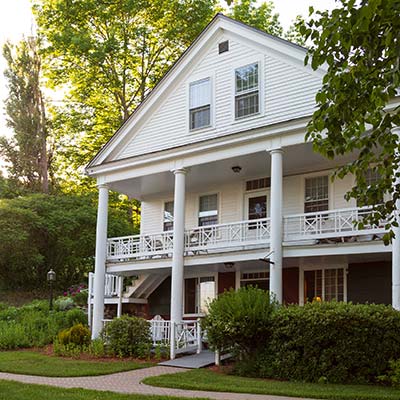These are tough times, no doubt about it. They were tough for the lodging industry after 9/11, too, and the immediate response was to discount rooms in hopes of filling them. Back then it worked, sort of, but the long term consequence was a period of several years to rebuild ADR and RevPAR. So what's an innkeeper to do? David King, CEO of Fulcrum has an article in Chief Marketer with a few suggestions, which I relate to innkeeping.
First, it's important to remember that discounts don't automatically equal value. Just because something costs less doesn't mean it's really nice. It may just be what a person can afford now, and when he can afford more he'll upgrade again. You never want anyone to think that your fabulous guest rooms are "cheap." But you do want them to know they are great value, regardless of price. Maybe they get something extra that adds value (flowers, a split of wine, a gas card) or a service (breakfast in bed, personalized tours, or reservations at the "impossible to get into" restaurant). Think about what you can do to increase value without discounting your rate.
Safety and security are important to consumer perceptions of value. It's one of the reasons that B&B's have been the lodging of choice for many female business travelers for years. They are perceived as safer than an anonymous motel. So, if you've got a wonderful, safe, homey, cozy place to be, emphasize it in your marketing. It's a great added value that your guest receives in addition to all the personal service you provide.
Especially in these times, remember that not all of your guests want the same thing. In fact, you may be getting some new guests that have never stayed with you or at a B&B before. Take advantage of the opportunity to introduce the joys of a distinctive, unique lodging experience and cultivate them for the future. Emphasize the fact that you can (and will) customize their guest experience. If they have limited resources, they want their dollar to go far. Innkeepers are uniquely poised to customize and deliver.
While you're at it, you should also recognize that some of your new guests may be different. As the world changes and travelers use different tools to plan and book their trips, whether for business or pleasure, either you are reaching them in their own language and providing them with what they want or you aren't. This is a great time to zero in on the i.guest, capture their attention, and keep them coming back.
There has never been a more important time to understand and care about your brand as an inn. What do you represent? Why would someone stay with you over another inn across town or across the state? If you have a clearly defined brand, nurture it and promote the heck out of it. And if you're not really sure that your brand message is clear (or even what that message is), you are probably missing an opportunity to build guest traffic and loyalty. Show people what you stand for, and deliver on that promise. Get help if you need it.
Finally, while you look for ways to survive this economic downturn in the short term, don't forget the medium and long term. In tough times, one of the first variable and discretionary costs that many businesses cut is advertising and marketing. This, along with aggressive discounting, starts a downward spiral that can cause some inns to fail. Plan carefully, and, if possible, increase your marketing spend to attract more new guests to your inn. If you think it through, you can build a solid base and increase your share of the pie even as others bemoan "the economy."
David King concludes, "There is no doubt that consumer and business customers will be seeking value in response to the pain and uncertainty in the economy. But smart marketers with the resources and vision to consider other steps will survive by doing more than rushing to the lowest common denominator." At The B&B Team, we couldn't agree more!
Peter





